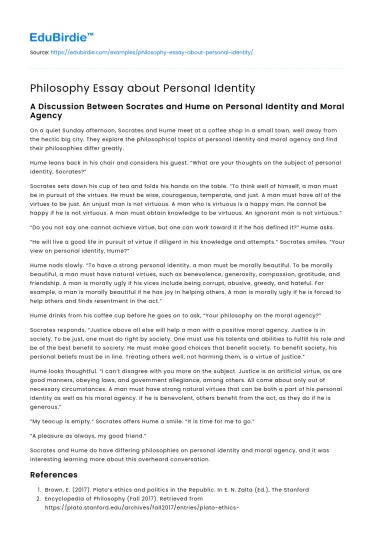A Discussion Between Socrates and Hume on Personal Identity and Moral Agency
On a quiet Sunday afternoon, Socrates and Hume meet at a coffee shop in a small town, well away from the hectic big city. They explore the philosophical topics of personal identity and moral agency and find their philosophies differ greatly.
Hume leans back in his chair and considers his guest. “What are your thoughts on the subject of personal identity, Socrates?”
Save your time!
We can take care of your essay
- Proper editing and formatting
- Free revision, title page, and bibliography
- Flexible prices and money-back guarantee
Socrates sets down his cup of tea and folds his hands on the table. “To think well of himself, a man must be in pursuit of the virtues. He must be wise, courageous, temperate, and just. A man must have all of the virtues to be just. An unjust man is not virtuous. A man who is virtuous is a happy man. He cannot be happy if he is not virtuous. A man must obtain knowledge to be virtuous. An ignorant man is not virtuous.”
“Do you not say one cannot achieve virtue, but one can work toward it if he has defined it?” Hume asks.
“He will live a good life in pursuit of virtue if diligent in his knowledge and attempts.” Socrates smiles. “Your view on personal identity, Hume?”
Hume nods slowly. “To have a strong personal identity, a man must be morally beautiful. To be morally beautiful, a man must have natural virtues, such as benevolence, generosity, compassion, gratitude, and friendship. A man is morally ugly if his vices include being corrupt, abusive, greedy, and hateful. For example, a man is morally beautiful if he has joy in helping others. A man is morally ugly if he is forced to help others and finds resentment in the act.”
Hume drinks from his coffee cup before he goes on to ask, “Your philosophy on the moral agency?”
Socrates responds, “Justice above all else will help a man with a positive moral agency. Justice is in society. To be just, one must do right by society. One must use his talents and abilities to fulfill his role and be of the best benefit to society. He must make good choices that benefit society. To benefit society, his personal beliefs must be in line. Treating others well, not harming them, is a virtue of justice.”
Hume looks thoughtful. “I can’t disagree with you more on the subject. Justice is an artificial virtue, as are good manners, obeying laws, and government allegiance, among others. All come about only out of necessary circumstances. A man must have strong natural virtues that can be both a part of his personal identity as well as his moral agency. If he is benevolent, others benefit from the act, as they do if he is generous.”
“My teacup is empty.” Socrates offers Hume a smile. “It is time for me to go.”
“A pleasure as always, my good friend.”
Socrates and Hume do have differing philosophies on personal identity and moral agency, and it was interesting learning more about this overheard conversation.
References
- Brown, E. (2017). Plato’s ethics and politics in the Republic. In E. N. Zalta (Ed.), The Stanford
- Encyclopedia of Philosophy (Fall 2017). Retrieved from https://plato.stanford.edu/archives/fall2017/entries/plato-ethics-politics/
- Cohon, R. (2018). Hume’s moral philosophy. In E. N. Zalta (Ed.), The Stanford Encyclopedia of
- Philosophy (Fall 2018). Retrieved from https://plato.stanford.edu/archives/fall2018/entries/hume-moral/
- Doyle, J. (n.d.). Socrates and Plato on moral psychology. Retrieved from https://www.academia.edu/11974728/Socrates_and_Plato_on_Moral_Psychology
- Schier, F. (1986). Hume and the aesthetics of agency. Proceedings of the Aristotelian Society, 87, new series, 121-135. Retrieved from http://www.jstor.org.libproxy.nau.edu/stable/4545059






 Stuck on your essay?
Stuck on your essay?

